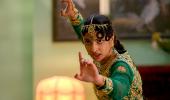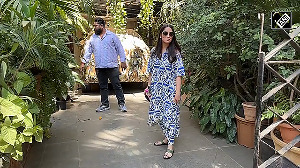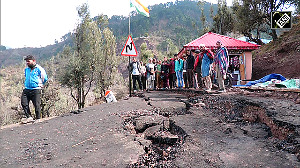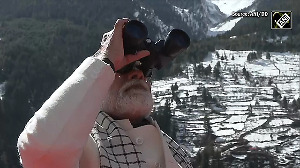'I think because India is a bigger country and Bollywood is such a well-oiled machine, the star thing has become so much bigger than the actor thing.'

Film-maker Asim Abbasi has been on the forefront of the Pakistani industry since the success of his 2018 film, Cake. In 2019, Pakistan sent Cake as its official entry for the Best International Film Oscar. Two years later, Abbasi was back with his explosive feminist series Churails, backed by India's Zindagi channel and Producer Shailja Kejriwal.
Kejriwal and Zindagi are once again the producers of Abbasi's new show Barzakh.
Currently streaming on the ZEE5 platform and its YouTube channel, Barzakh is a gorgeously shot ensemble drama, about a patriarch (Salman Sahid) struggling with dementia and his estranged sons Shehryar (Fawad Khan) and Saifullah (Fawad M Khan), with elements of the supernatural and the other worldly existence.
The show also stars Pakistani actress Sanam Saeed as Scheherezade, the patriarch's adopted daughter whose origins are part of the show's other worldly mystery. This is the first time Fawad Khan and Saeed have appeared together in a project since their hugely popular 2012 series Zindagi Gulzar Hai. But the two actors are not cast as romantic leads in Barzakh.
Set in a picturesque mountain location, the show's haunting quality slowly pulls the audience into a part imaginary world that Abbasi has created. He recently said that Barzakh is like Cake, but on acid.
Aseem Chhabra spoke to London-based Abbasi about Barzakh, his star cast and the controversies the show is beginning to generate in Pakistan: "There is a queer subplot and from episode three onwards, there has been some negative buzz about it. There is an almost kiss between two men. It happened during Churails also, where they took one clip out of context, and released it on Twitter. It became such a huge deal that ZEE5 had to be shut down in Pakistan."
Asim, from Cake and Churails, how did you transition into the area of the magic realism, the other worldly life. What were you thinking as you were writing this show?
As it is clear from the show, I was thinking of so many themes.
But honestly, after the success of Churails, Shailja and Zindagi were keen for me to do something again. It was a unique position where I was offered a blank canvas, which doesn't happen to writers and directors very often.
It was a thought-out plan, but also a stream of consciousness of a person in his 40s, reflecting back on the life he had lived and about his family, his parents.
Also, some existential questions which were there anyway, but the pandemic had highlighted them more with deaths happening around us.
A couple of years ago, I lost my father and I was reading and thinking about life, death, and what happens after.
It also became an experiment in how content is consumed, where I was going to make the audience become more active than they generally are.
What happens when audiences become co-creators to a certain degree?
I chose not to explain why certain things happened. Instead, it is up to the audience to figure that out.
Are they even happening in the father's mind because he has dementia? Or is this some sort of a supernatural world?

Indians are used to watching Pakistani family dramas and romantic tales. But now quite a few film-makers are exploring a range of subjects in Pakistan -- from Zindagi Tamsha, to In Flames, Joyland, Cake and Churails. I know how the censors have reacted to these films, but what about the Pakistan audience?
I think some of them are confused.
A large number of what you would call the mass audience were excited to see Fawad and Sanam together, despite my attempt to be very clear that it was not another Zindagi Gulzar Hai.
But I think it's hard to shake those expectations off from the audience.
There is a queer subplot and from episode three onwards, there has been some negative buzz about it.
There is an almost kiss between two men.
It happened during Churails also, where they took one clip out of context, and released it on Twitter. It became such a huge deal that ZEE5 had to be shut down in Pakistan.
But Barzakh is available on YouTube in Pakistan and they have again taken a clip without giving the full context and it's become some kind of an agenda.
I have heard people say it's such a beautiful show, but why has Asim Abbasi added a gay subplot?
I am dealing with the whole spectrum of masculinity, talking about how toxicity travels from generation to generation. That's the part of a dysfunctional family I am interested in.
If I was talking about a straight father and a straight son, it made no sense to me to just talk about it from a straight person's point of view because toxicity and how patriarchy works, how men become closeted, it's kind of important in that setting.
You can't argue too much with these people. It will eventual write itself out.
I am hoping people will continue to see it. Those who connect with it, they love it. But you get both sides.
You actually don't explore the queer subplot to that extent. In comparison, that was the main theme of Joyland.
But the Joyland version released in Pakistan was different.
Some of the most beautiful scenes from that film were cut out.
One of my favourite scenes from Saim's (Siddiq) film is when Haider and Biba are trying to be intimate. That scene just knocked me out.
I don't think that scene was there in the Pakistani version.

Talking about your casting, is Fawad Khan the biggest star in Pakistan, like Shah Rukh Khan level?
Yes. Although Shah Rukh Khan is a little different because India is such a large country. But Fawad is the biggest superstar in Pakistan.
I find it interesting that he joined an ensemble cast for the show where he is not the lead actor. Some Bollywood actors have performed in OTT shows but you will never see Shah Rukh, Salman or Ranveer Singh do that. So what are the differences between Pakistani and Bollywood actors?
I think because India is a bigger country and Bollywood is such a well-oiled machine, the star thing has become so much bigger than the actor thing.
In Pakistan, it's a double-edged sword where the industry is not big and that's unfortunate, but people are still able to maintain why they started doing this -- to become actors.
Shah Rukh also wanted to be an actor. This was his passion.
But somewhere along the line with managers, agents and box office draws, it becomes so industrial, so much about business. And you have so many voices in your head.
In Pakistan, we have been protected from that because our industry is small.
Fawad is a big actor, but there are not 20 people walking with him. There is one manager and perhaps one stylist. It's not the same game as in Bollywood.
That really allows the Pakistani actors to maintain their authenticity in terms of their passion for acting.
But I didn't initially reach out to Fawad because I also believed he would not do an ensemble project.
Eventually, we sent him the script he said he loved ensemble films.
Kapoor & Sons was an ensemble film. He said I am open to all things where I am able to show my craft.
He is very clear that he wants to protect himself from the stardom and that's a beautiful place to be in.

I recognised Fawad M Khan from Churails. He was the policeman who was attracted to Nimra Bucha's character. He is so good in this show.
Yes, you are right. I have never written a character with an actor in mind. This was the first time when I was writing Barzakh, I was hoping that Fawad M Khan would play Saifullah.
I knew he had this nuanced, smallness of things that he does, which were very important for a character who wasn't big on vocalising his feelings.
You have worked with Sanam in Cake where she was almost the lead character. In Barzakh, there is no lead character but Sanam carries the show on her shoulders, since the voice-over is hers.
Sanam and I have a great relationship.
I wanted her for Churails as well but she was busy doing another film.
We have a comfort level where she understands how I work. I can be open and free with her and say, 'Sanam we need to do it differently.'
Sanam always auditions and she did for Scheherezade's role as well.
But that was one audition I was hoping would work out.
Sanam has this unique blend of hardness and softness. She can be hot and cold at the same time.
That is important for someone who was playing an otherworldly character. And it was super difficult because she couldn't emote to the level that a human could.
But she also couldn't be stiff and not be empathetic.
Finding that balance was not an easy task.
I think she did a retty phenomenal job.

You just said something very interesting: Sanam auditioned for the roll. These guys are big actors but did you audition all three of them?
We couldn't audition Fawad because he joined too late.
But usually, actors do and Sanam always auditions for me, no matter how big she is, because we both want to be sure she is right for the role.
That's amazing. When I asked you about the differences between Bollywood and Pakistani actors, here is one. Alia Bhatt and Deepika Padukone will never audition unless they are planning to work on a Hollywood project.
But that goes back to the same thing when you are no longer just an actor.
Auditions are a huge part of an actor's life.
But when you cross over to becoming a star, you are not allowed to be just an actor.
Where was the show shot? The locations are stunning.
It's a place called Hunza Valley, which is in northern Pakistan in Gilgit Baltistan.
The mountainous terrain is such a huge character in this show that we had to get the geography of it right.

It was stunning. The other thing that I noticed you shot the show in the fall because you have the leaves changing colours. I would imagine it was deliberately planned because there is a brown colour palette throughout the show, including the clothes they wear.
From the story point of view, fall or autumn was very important because it was about rebirth.
It was about leaves falling, everything withering and then coming back to life in spring.
We decided at the scripting stage that it needed to happen in the fall. And that ended up dictating the colour palette.
Hunza is a beautiful, haunting place. But the mountains can get very melancholic as well.
I had always seen that beauty and how breathtaking the mountains are.
But once you start spending time, there's something really sad about them. Maybe because we went there at the tail end of summer.
We saw it turn into fall and then winter. By then, I felt like I had been there for a lifetime.
I find your relationship with Shailja and Zindagi very fascinating. These professional ties continue, despite the ups and downs in the India-Pakistan relationships. But what does it bring to the table?
It opens up a new world.
I think it's especially so with a show like Barzakh which is not based on religion.
We live in different countries where we have cultural similarities.
We have lots of things we can bond over but we can also bring things to the table that are unique to us because of our own experiences. It's definitely been a very enriching process for me.
Of course, it's a bigger audience. We don't have a local platform in Pakistan.
We don't have a strong Netflix presence. Netflix is now doing their first show in Pakistan. So for an entity like Zindagi to say we are interested in creating unique content is very encouraging.












 © 2025
© 2025